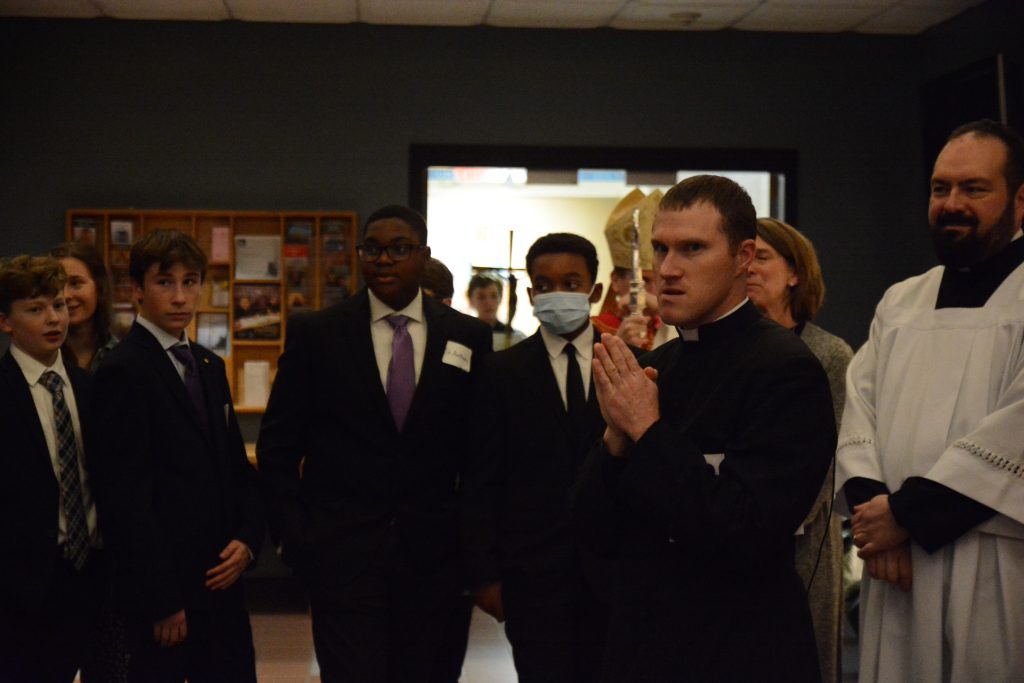
The Gift of a Child
During Advent, the Tennessee Register is publishing a series of guest editorials on the theme “The Gift of a Child: An Advent Celebration of the Family.” This is the last of the series. Others will examine marriage and the gift of a child, motherhood, fatherhood and the family. All are be available at tennesseeregister.com/gift.
Father Andrew Bulso
Not everybody loves grammar, but I do. I attribute that in large part to the excellent instruction I received from Mrs. Barbara Ohls who taught my seventh and eighth grade English classes at Overbrook School. Perhaps this reflection will draw others into a deeper appreciation of grammar. I suspect my fellow grammar-lovers will enjoy it. My hope and prayer is that all my readers may be drawn into a deeper love of our Lord.
The phrase “the gift of the child” may be understood in two different ways. In the first sense, it expresses the fact that the Christ-child in Bethlehem is a gift given to us by the Father.
“A child is born for us, a son is given us” (Isaiah 9:6).
“God so loved the world that he gave his only son” (John 3:16).
For the grammar nerds out there, we might call this the “objective genitive,” to borrow a concept applied especially in Latin and Greek grammar. “Child” can be taken as the grammatical object of the noun “gift,” which derives from the verb “to give.”
In the second sense, however, we can understand the expression to mean that the child is giving a gift. In this sense, the phrase invites us to reflect on the gift that the child desires to offer us. “I came that they might have life and have it to the full” (John 10:10). Turning again to the grammar nerds, we might call this the “subjective genitive,” since now “the child” is taken to be the subject and “the gift” to be the object.
What I propose to you, dear readers, is that we see the first meaning especially in the crib and the second especially on the cross.
As we gaze tenderly at the infant Jesus in the manger, we recognize the great gift that the Father has given to us. There are many things that we desire in life: sustenance, wealth, success, fulfillment. “Your heavenly Father knows that you need all these things” (Matthew 6:32).
These immediate, tangible desires tend to steal our attention away from our deeper, intangible needs. Our heavenly Father, however, has already taken care of those, too. Perhaps the best gifts are the ones we do not expect. In the gift of the child, our Father has given us a most unexpected gift – and one that fulfills the deepest longing of our hearts.
Ave Crux, spes unica – hail the Cross, our only hope. The child himself offers us a gift; he offers his life for the salvation of the world. “You shall call his name Jesus, for he will save his people from their sins” (Matthew 1:21).
The child whom we first contemplated as a gift in the crib now hangs from the cross giving every last bit of himself. If we doubt whether we can still call him a child – this fully grown man suffering unjust execution – we need only glance at his mother standing by. Yes, indeed he is still someone’s child. (Whenever we find it difficult to see someone’s dignity, we need only remind ourselves that that person is someone’s child.) And just as Isaac cooperated in being offered by his father Abraham, so the Son cooperates in becoming a gift of the Father. The child gives himself.
The two meanings – objective and subjective, crib and cross – are brought together in the mystery of the Eucharist. The name Bethlehem means “house of bread,” and the manger that served as the Divine Infant’s crib is nothing other than a feeding trough. Thus his birth in a stable in Bethlehem anticipates the bread that he would give us as a memorial of his Death and Resurrection – the bread that is truly his Body and Blood.
Through the grace of the Most Holy Eucharist, may all people everywhere come to know “the gift of the child.” Merry Christmas!
Father Andrew Bulso is pastor of St. Edward Church in Nashville.









